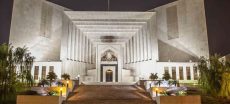[vc_row][vc_column][vc_column_text dp_text_size=”size-4″]In the written order of the appeals related to amendments in the accountability law, the Supreme Court stated that Imran Khan, the imprisoned respondent and PTI Chairman, could have the opportunity to represent himself in court if he desired. The court also directed that the former prime minister should receive copies of the intra-court appeals through the superintendent of Rawalpindi’s Adiala Jail, where he was currently incarcerated.
The order specified, “If he [Imran] wishes to be represented [in court], the jail superintendent should take the necessary steps.”
A larger bench led by Chief Justice of Pakistan Qazi Faez Isa, with the participation of other justices, heard the case on October 31. They permitted accountability courts to continue their proceedings in corruption cases but refrained from delivering final judgments. This was in response to the first-ever two intra-court appeals against the majority verdict on September 15, which had invalidated amendments to the country’s anti-corruption law.
Read more : Lawyer Of Imran Khan Denies Claims Of Prison Poisoning
The written order established that accountability courts could proceed with the trials until the next hearing date but could not announce final judgments.
The case’s hearing was adjourned until the detailed judgment on the Supreme Court (Practice and Procedure) Act, 2023, which aims to restrict the discretionary authority of the chief judge, is issued.
The order noted that according to Section 4 of the Practice and Procedure Act, “where [the] interpretation of the constitutional provisions is involved,” a bench of this court comprising not less than five judges must hear the case.
It mentioned that Saad Mumtaz Hashmi, representing the federal government in the first intra-court appeal, argued that the majority decision on September 15, 2023, violated the Act by being decided by a three-judge bench instead of five.
The Attorney General for Pakistan (AGP), Mansoor Usman Awan, and senior lawyer Farooq H Naek, who represented Zuhair Ahmed Siddiqui in the second intra-court appeal, supported Hashmi’s argument.
The order pointed out that although the 3rd amendment was in effect during the hearings related to the amendments, the September 15 judgment did not address it. This created an anomalous situation as the judgment didn’t tackle the 3rd Amendment, which had addressed issues mentioned in one of the intra-court appeals.
In June 2022, PTI chief Imran Khan challenged the amendments to the National Accountability Ordinance introduced by the previous PML-N led government in the Supreme Court. He argued that these changes would enable public office holders to escape accountability for white-collar crimes. He filed a constitutional petition against the amendments under Article 184(3).[/vc_column_text][/vc_column][/vc_row]











